499 books about Labor and 18
start with J
499 books about Labor and 18
499 books about Labor
18 start with J start with J
18 start with J start with J

The Jackson Project
War in the American Workplace
Phil Cohen
University of Tennessee Press, 2016
In the spring of 1989, union organizer Phil Cohen journeyed to Jackson, Tennessee, to sort out the troubled situation at a historic cotton mill. His task as a representative of the Amalgamated Clothing and Textile Workers Union was to rebuild a failing local and the problems were daunting; an anti-union company in financial disarray, sharply declining union membership, and myriad workplace grievances. In the tumultuous months ahead, ownership of the plant twice switched hands, and he would come to fear for his life and consider desperate measures to salvage the union’s cause.
In this riveting memoir, Cohen takes the reader from the union hall and factory gates to the bargaining table and courtroom, and ultimately to the picket line. We see him winning the trust of disillusioned union members, negotiating with a hostile employer and its high-powered legal counsel, and hitting the pavement with leaflets and union cards in hand. We get to know the millworkers with whom he formed close bonds, including a stormy romance with a young woman at the plant. His up-close account of the struggle brims with telling descriptions of the negotiating process, the grinding work at the textile mill, the lives of its employees outside the workplace, and the grim realities of union busting in America. When the organizer’s four-year-old daughter accompanies him to the field, a unique an unexpected dimension is added to the chronicle.
A compelling, dramatic story that alternated between major triumphs and frustrating setbacks, The Jackson Project provides a rare look at the labor movement in the American South from an insider’s perspective.
In this riveting memoir, Cohen takes the reader from the union hall and factory gates to the bargaining table and courtroom, and ultimately to the picket line. We see him winning the trust of disillusioned union members, negotiating with a hostile employer and its high-powered legal counsel, and hitting the pavement with leaflets and union cards in hand. We get to know the millworkers with whom he formed close bonds, including a stormy romance with a young woman at the plant. His up-close account of the struggle brims with telling descriptions of the negotiating process, the grinding work at the textile mill, the lives of its employees outside the workplace, and the grim realities of union busting in America. When the organizer’s four-year-old daughter accompanies him to the field, a unique an unexpected dimension is added to the chronicle.
A compelling, dramatic story that alternated between major triumphs and frustrating setbacks, The Jackson Project provides a rare look at the labor movement in the American South from an insider’s perspective.
[more]

Job Loss, Identity, and Mental Health
Norris, Dawn R
Rutgers University Press, 2016
Our jobs are often a big part of our identities, and when we are fired, we can feel confused, hurt, and powerless—at sea in terms of who we are. Drawing on extensive, real-life interviews, Job Loss, Identity, and Mental Health shines a light on the experiences of unemployed, middle-class professional men and women, showing how job loss can affect both identity and mental health.
Sociologist Dawn R. Norris uses in-depth interviews to offer insight into the experience of losing a job—what it means for daily life, how the unemployed feel about it, and the process they go through as they try to deal with job loss and their new identities as unemployed people. Norris highlights several specific challenges to identity that can occur. For instance, the way other people interact with the unemployed either helps them feel sure about who they are, or leads them to question their identities. Another identity threat happens when the unemployed no longer feel they are the same person they used to be. Norris also examines the importance of the subjective meaning people give to statuses, along with the strong influence of society’s expectations. For example, men in Norris’s study often used the stereotype of the “male breadwinner” to define who they were. Job Loss, Identity, and Mental Health describes various strategies to cope with identity loss, including “shifting” away from a work-related identity and instead emphasizing a nonwork identity (such as “a parent”), or conversely “sustaining” a work-related identity even though he or she is actually unemployed. Finally, Norris explores the social factors—often out of the control of unemployed people—that make these strategies possible or impossible.
A compelling portrait of a little-studied aspect of the Great Recession, Job Loss, Identity, and Mental Health is filled with insight into the identity crises that unemployment can trigger, as well as strategies to help the unemployed maintain their mental strength.
[more]
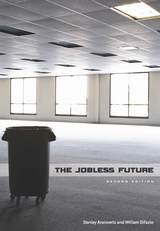
The Jobless Future
Second Edition
Stanley Aronowitz
University of Minnesota Press, 2010
High technology will destroy more jobs than it creates. This grim prediction was first published in the 1994 edition of The Jobless Future, an eerily accurate title that could have been written for today's dismal economic climate. Fully updated and with a new introduction by Stanley Aronowitz and William DiFazio, The Jobless Future warns that jobs as we know them-long-term, with benefits-are an endangered species.
[more]
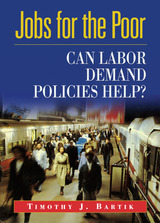
Jobs for the Poor
Can Labor Demand Policies Help?
Timothy J. Bartik
Russell Sage Foundation, 2001
Even as the United States enjoys a booming economy and historically low levels of unemployment, millions of Americans remain out of work or underemployed, and joblessness continues to plague many urban communities, racial minorities, and people with little education. In Jobs for the Poor, Timothy Bartik calls for a dramatic shift in the way the United States confronts this problem. Today, most efforts to address this problem focus on ways to make workers more employable, such as job training and welfare reform. But Bartik argues that the United States should put more emphasis on ways to increase the interest of employers in creating jobs for the poor—or the labor demand side of the labor market. Bartik's bases his case for labor demand policies on a comprehensive review of the low-wage labor market. He examines the effectiveness of government interventions in the labor market, such as Welfare Reform, the Earned Income Tax Credit, and Welfare-to-Work programs, and asks if having a job makes a person more employable. Bartik finds that public service employment and targeted employer wage subsidies can increase employment among the poor. In turn, job experience significantly increases the poor's long-run earnings by enhancing their skills and reputation with employers. And labor demand policies can avoid causing inflation or displacing other workers by targeting high-unemployment labor markets and persons who would otherwise be unemployed. Bartik concludes by proposing a large-scale labor demand program. One component of the program would give a tax credit to employers in areas of high unemployment. To provide disadvantaged workers with more targeted help, Bartik also recommends offering short-term subsidies to employers—particularly small businesses and nonprofit organizations—that hire people who otherwise would be unlikely to find jobs. With experience from subsidized jobs, the new workers should find it easier to obtain future year-round employment. Although these efforts would not catapult poor families into the middle class overnight, Bartik offers a powerful argument that having a full-time worker in every household would help improve the lives of millions. Jobs for the Poor makes a compelling case that full employment can be achieved if the country has the political will and adopts policies that address both sides of the labor market. Copublished with the W. E. Upjohn Institute for Economic Research
[more]

John L. Lewis
A Biography
Melvyn Dubofsky and Warren Van Tine
University of Illinois Press, 1986
John L. Lewis (1880-1969), who ruled the United Mine Workers for four decades beginning in 1919, defied presidents, challenged Congress, and kept American political life in an uproar. Drawing upon previously untapped resources in the UMW archives and upon oral histories by major figures of the 1930s and 1940s, the authors have created a remarkable portrait of this 'self-made man' and his times.
[more]

Journal of Labor Economics, volume 40 number 3 (July 2022)
The University of Chicago Press
University of Chicago Press Journals, 2022

Journal of Labor Economics, volume 40 number 4 (October 2022)
The University of Chicago Press
University of Chicago Press Journals, 2022
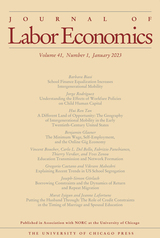
Journal of Labor Economics, volume 41 number 1 (January 2023)
The University of Chicago Press
University of Chicago Press Journals, 2023
This is volume 41 issue 1 of Journal of Labor Economics. Founded in 1983 as the first journal devoted specifically to labor economics, the Journal of Labor Economics (JOLE) presents international research on issues affecting social and private behavior, and the economy. JOLE’s contributors investigate various aspects of labor economics, including supply and demand of labor services, personnel economics, distribution of income, unions and collective bargaining, applied and policy issues in labor economics, and labor markets and demographics.
[more]
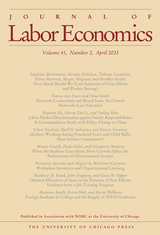
Journal of Labor Economics, volume 41 number 2 (April 2023)
The University of Chicago Press
University of Chicago Press Journals, 2023
This is volume 41 issue 2 of Journal of Labor Economics. Founded in 1983 as the first journal devoted specifically to labor economics, the Journal of Labor Economics (JOLE) presents international research on issues affecting social and private behavior, and the economy. JOLE’s contributors investigate various aspects of labor economics, including supply and demand of labor services, personnel economics, distribution of income, unions and collective bargaining, applied and policy issues in labor economics, and labor markets and demographics.
[more]
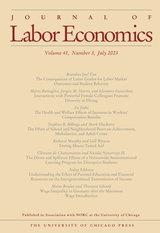
Journal of Labor Economics, volume 41 number 3 (July 2023)
The University of Chicago Press
University of Chicago Press Journals, 2023
This is volume 41 issue 3 of Journal of Labor Economics. Founded in 1983 as the first journal devoted specifically to labor economics, the Journal of Labor Economics (JOLE) presents international research on issues affecting social and private behavior, and the economy. JOLE’s contributors investigate various aspects of labor economics, including supply and demand of labor services, personnel economics, distribution of income, unions and collective bargaining, applied and policy issues in labor economics, and labor markets and demographics.
[more]
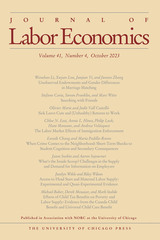
Journal of Labor Economics, volume 41 number 4 (October 2023)
The University of Chicago Press
University of Chicago Press Journals, 2023
This is volume 41 issue 4 of Journal of Labor Economics. Founded in 1983 as the first journal devoted specifically to labor economics, the Journal of Labor Economics (JOLE) presents international research on issues affecting social and private behavior, and the economy. JOLE’s contributors investigate various aspects of labor economics, including supply and demand of labor services, personnel economics, distribution of income, unions and collective bargaining, applied and policy issues in labor economics, and labor markets and demographics.
[more]
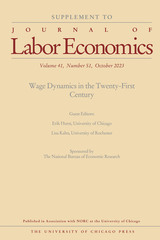
Journal of Labor Economics, volume 41 number S1 (October 2023)
The University of Chicago Press
University of Chicago Press Journals, 2023
This is volume 41 issue S1 of Journal of Labor Economics. Founded in 1983 as the first journal devoted specifically to labor economics, the Journal of Labor Economics (JOLE) presents international research on issues affecting social and private behavior, and the economy. JOLE’s contributors investigate various aspects of labor economics, including supply and demand of labor services, personnel economics, distribution of income, unions and collective bargaining, applied and policy issues in labor economics, and labor markets and demographics.
[more]
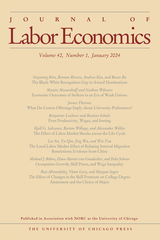
Journal of Labor Economics, volume 42 number 1 (January 2024)
The University of Chicago Press
University of Chicago Press Journals, 2024
This is volume 42 issue 1 of Journal of Labor Economics. Founded in 1983 as the first journal devoted specifically to labor economics, the Journal of Labor Economics (JOLE) presents international research on issues affecting social and private behavior, and the economy. JOLE’s contributors investigate various aspects of labor economics, including supply and demand of labor services, personnel economics, distribution of income, unions and collective bargaining, applied and policy issues in labor economics, and labor markets and demographics.
[more]

Journal of Labor Economics, volume 42 number 2 (April 2024)
The University of Chicago Press
University of Chicago Press Journals, 2024
This is volume 42 issue 2 of Journal of Labor Economics. Founded in 1983 as the first journal devoted specifically to labor economics, the Journal of Labor Economics (JOLE) presents international research on issues affecting social and private behavior, and the economy. JOLE’s contributors investigate various aspects of labor economics, including supply and demand of labor services, personnel economics, distribution of income, unions and collective bargaining, applied and policy issues in labor economics, and labor markets and demographics.
[more]

Journal of Labor Economics, volume 42 number S1 (April 2024)
The University of Chicago Press
University of Chicago Press Journals, 2024
This is volume 42 issue S1 of Journal of Labor Economics. Founded in 1983 as the first journal devoted specifically to labor economics, the Journal of Labor Economics (JOLE) presents international research on issues affecting social and private behavior, and the economy. JOLE’s contributors investigate various aspects of labor economics, including supply and demand of labor services, personnel economics, distribution of income, unions and collective bargaining, applied and policy issues in labor economics, and labor markets and demographics.
[more]
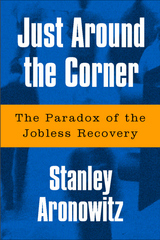
Just Around The Corner
The Paradox Of The Jobless Recovery
Stanley Aronowitz
Temple University Press, 2005
Americans have always believed that economic growth leads to job growth. In this groundbreaking analysis, Stanley Aronowitz argues that this is no longer true. Just Around the Corner examines the state of the American economy as planned by Democrats and Republicans over the last thirty years. Aronowitz finds that economic growth has become "delinked" from job creation, and that unemployment and underemployment are a permanent condition of our economy. He traces the historical roots of this state of affairs and sees under the surface of booms and busts a continuum of economic austerity that creates financial windfalls for the rich at the expense of most Americans. Aronowitz also explores the cultural and political processes by which we have come to describe and accept economics in the United States. He concludes by presenting a concrete plan of action that would guarantee employment and living wages for all Americans. With both measured analysis and persuasive reasoning, Just Around the Corner provides an indispensable guide to our current economic predicament and a bold challenge to economists and policymakers.
[more]

Just Transitions
Social Justice in the Shift Towards a Low-Carbon World
Edouard Morena
Pluto Press, 2022
In the field of 'climate change', no terrain goes uncontested. The terminological tug of war between activists and corporations, scientists and governments, has seen radical notions of 'sustainability' emptied of urgency and subordinated to the interests of capital. 'Just Transition' is the latest such battleground, and the conceptual keystone of the post-COP21 climate policy world. But what does it really mean?
Just Transition emerged as a framework developed within the trade union movement to encompass a range of social interventions needed to secure workers' and frontline communities' jobs and livelihoods as economies shift to sustainable production. Just Transitions draws on a range of perspectives from the global North and South to interrogate the overlaps, synergies and tensions between various understandings of the Just Transition approach. As the concept is entering the mainstream, has it lost its radical edge, and if so, can it be recovered?
Written by academics and activists from around the globe, this unique edited collection is the first book entirely devoted to Just Transition.
Just Transition emerged as a framework developed within the trade union movement to encompass a range of social interventions needed to secure workers' and frontline communities' jobs and livelihoods as economies shift to sustainable production. Just Transitions draws on a range of perspectives from the global North and South to interrogate the overlaps, synergies and tensions between various understandings of the Just Transition approach. As the concept is entering the mainstream, has it lost its radical edge, and if so, can it be recovered?
Written by academics and activists from around the globe, this unique edited collection is the first book entirely devoted to Just Transition.
[more]
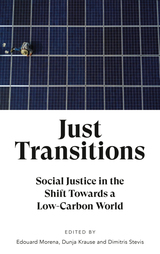
Just Transitions
Social Justice in the Shift Towards a Low-Carbon World
Edouard Morena
Pluto Press, 2019
In the field of 'climate change', no terrain goes uncontested. The terminological tug of war between activists and corporations, scientists and governments, has seen radical notions of 'sustainability' emptied of urgency and subordinated to the interests of capital. 'Just Transition' is the latest such battleground, and the conceptual keystone of the post-COP21 climate policy world. But what does it really mean?
Just Transition emerged as a framework developed within the trade union movement to encompass a range of social interventions needed to secure workers' and frontline communities' jobs and livelihoods as economies shift to sustainable production. Just Transitions draws on a range of perspectives from the global North and South to interrogate the overlaps, synergies and tensions between various understandings of the Just Transition approach. As the concept is entering the mainstream, has it lost its radical edge, and if so, can it be recovered?
Written by academics and activists from around the globe, this unique edited collection is the first book entirely devoted to Just Transition.
Just Transition emerged as a framework developed within the trade union movement to encompass a range of social interventions needed to secure workers' and frontline communities' jobs and livelihoods as economies shift to sustainable production. Just Transitions draws on a range of perspectives from the global North and South to interrogate the overlaps, synergies and tensions between various understandings of the Just Transition approach. As the concept is entering the mainstream, has it lost its radical edge, and if so, can it be recovered?
Written by academics and activists from around the globe, this unique edited collection is the first book entirely devoted to Just Transition.
[more]
READERS
Browse our collection.
PUBLISHERS
See BiblioVault's publisher services.
STUDENT SERVICES
Files for college accessibility offices.
UChicago Accessibility Resources
home | accessibility | search | about | contact us
BiblioVault ® 2001 - 2024
The University of Chicago Press









